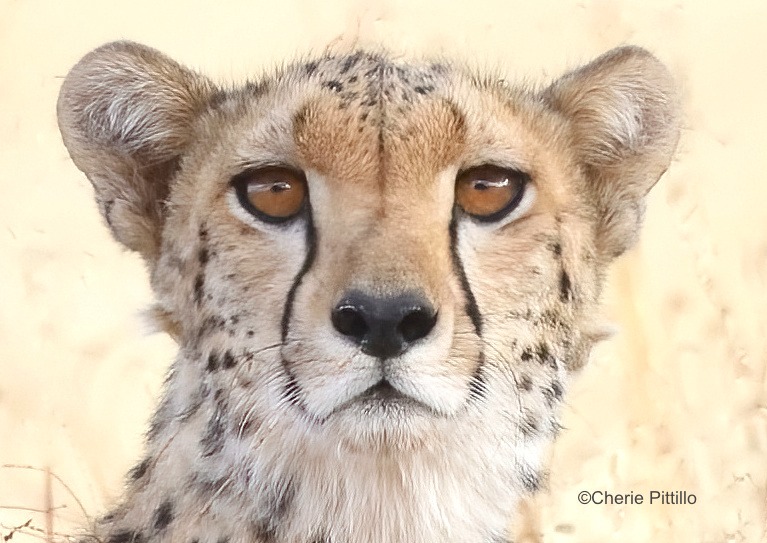Acinonyx jubatus
A FEW CHEETAH FEAT-URES
Let’s face it. A cheetah face is an amalgam of adaptations. Eyes are set high for maximum vision on a small head with small ears. Many nerve cells lead to the optic nerve to assist in detecting prey. Those black tear stripes may enhance focus on prey while reducing glare from the sun. Enlarged nostrils and extensive sinuses aid in oxygen intake for rapid acceleration. Breath rate increases from 60 breaths per minute to 150! During fast runs, the nictitating membrane helps protect the eyes. Even the whiskers appear to be under-developed compared with big cats who are more active hunting at night.
From the side view, the shorter muzzle sports weaker jaws and smaller canine teeth unlike the larger felids. Therefore the cheetah seems more vulnerable when trying to defend its prey from other predators.


CHEETAH FEET-URES…CHEAT-TOES
Cheetah feet somewhat resemble dogs’ feet more than cats with their semi-retractable, blunt claws. Those claws help grip the ground to increase traction. Even ridges on the foot pad add traction like tire treads. And their paws are narrower than other large felids. I might have to call their adaptive toes…Cheat-toes or Cheetoes!


Higher up on the leg, the curved, sharp dewclaw stabilizes the wrist and provides extra traction for turns during running. It is also used to swat and trip prey.

Of course those claws are useful during scratching and grooming or a “cata-comb.”


BOLDER SHOULDER

Although our shoulders are attached to our body by bone, cat shoulder blades are attached to muscle and are “looser.” This enables the cat to improve their flexibility, to lengthen their body, and to pounce quickly on prey.
TAIL TALE
A cheetah tail is about two-thirds of its total body length. Those black and white markings assist in camouflage during hunting or may confuse predators. A cheetah may have a black tipped tail or a white one. Researchers believe the tail tip helps cubs to follow their mother in tall grasses.

During a rapid sprint, cheetah paws have little ground contact. Then the tail can act as a counterbalance for turns. Even the somewhat flattened tip serves as a rudder. Moving the tail back and forth continually adjusts to a prey’s movement. This allows for sharp turns during a speedy chase.
FLEX-TENSIONS? AND ANOTHER PAW-NDER ABOUT PAWS
The incredible flexibility of a cheetah’s spine along with hip and shoulder extensions can extend one stride to 21 feet! Four strides can be done in a second. All four feet come off the ground when the legs are extended and then when the four legs are clumped under the body. I didn’t manage to photograph one at 70 mph! But here is photo of three paws off the ground.


Let this be a catalyst to write on your cata-list for a closer look in part 2 about the need for speed in this amazing species including its daily routine with future potential changes.
ENJOY NATURE TO SPOT WILDLIFE!
DISCLAIMER: Some references may not agree or I may not have found the most recent name changes. Plus autocorrect doesn’t like scientific names or language translations.
Estes, Richard D. The Safari Companion, Eaton, Randall L. THE CHEETAH. THE BIOLOGY, ECOLOGY, AND BEHAVIOR OF AN ENDANGERED SPECIES
https://cheetah.org/learn/about-cheetahs/.
Cherie Pittillo, “nature inspired,” photographer and author, explores nature everywhere she goes. She’s identified 56 bird species in her Merida, Yucatan backyard view. Her monthly column features anecdotes about birding in Merida, Yucatan and also wildlife beyond the Yucatan.
Contact: [email protected] All rights reserved, ©Cherie Pittillo
.
.
Semi social with Mother and adult daughter and several cubs
DISCLAIMER: Some references may not agree or I may not have found the most recent name changes. Plus autocorrect doesn’t like scientific names or language translations.
Sal a Pajarear Yucatán (Guía de aves), A Guide to the Birds of Mexico and Northern Central Mexico, The Crossley Guide,
https://sounddino.com/en/effects/cheetah
https://sounddino.com/en/effects/cheetah
https://sounddino.com/en/effects/cheetah
Cherie Pittillo, “nature inspired,” photographer and author, explores nature everywhere she goes. She’s identified 56 bird species in her Merida, Yucatan backyard view. Her monthly column features anecdotes about birding in Merida, Yucatan and also wildlife beyond the Yucatan.
Contact: [email protected] All rights reserved, ©Cherie Pittillo

